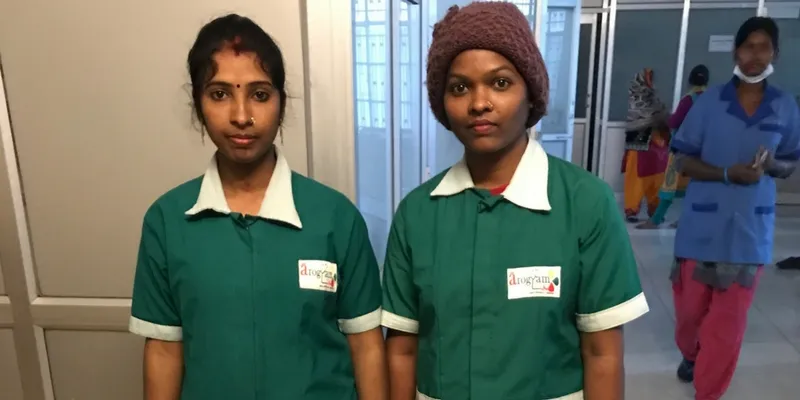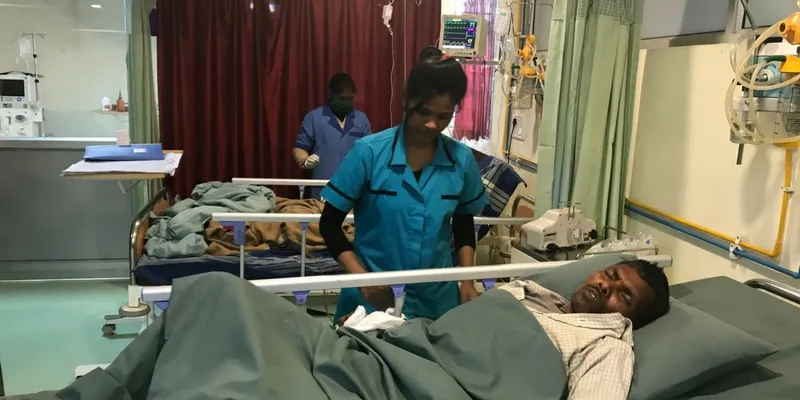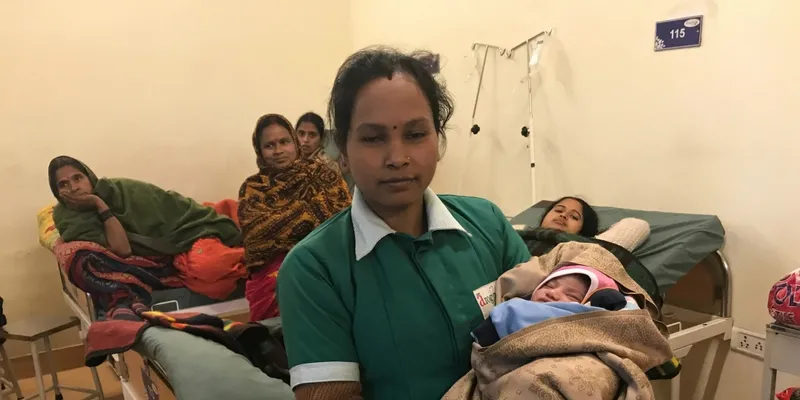Women at work: a day in the life of nurses
In our series ‘women at work,’ we bring to you moments from the of life of nurses in a small town, who work day and night to tend to their patients.

Arogyam Hospital is said to be the best hospital in the small town of Hazaribagh, Jharkhand. With multispecialty facilities, it caters to the needs of surrounding villages as well. Set in the district chowk, it is four-storied building with glass panelling has eminent doctors practising. But the backbone of this hospital are the nurses — they are the ones who provide care to the patients all day long.
But the work they do often remains unacknowledged, neither does their profession get the respect it deserves. These nurses are overworked, mistreated, underpaid, and yet ready to put their best foot forward every day.
In our series ‘women at work’, we bring to you the life of the nurses at Arogyam Hospital who work hours on end, attending to their patients.
Dealing with the patient’s family
Right in front of the entrance of the hospital, is the OPD lobby where we met Babita Kumari — a 33-year-old nurse — calling out the names of patients when they need to walk into the doctor’s chamber.
Hailing from Chatra in Jharkhand, Babita is trained as an auxiliary nurse midwife; she tells us that her mother-in-law was a nurse too.

She says, “I got married in 2004, was trained at the Sadar Hospital, Hazaribagh. My mother-in-law helped me become a nurse as she was a nurse as well. Presently, I work in the OPD, where I take care of preliminary check-ups such as weight, temperature and blood pressure, and also at times, I deal with the patient's family.”
She highlights that patients have to wait for doctors, and says, “Sometimes, the wait turns into hours, and the family gets angry and starts shouting at us. A similar instance happened today: a doctor was on call, two patients had to wait for more than two hours. They started shouting at me but I couldn’t do anything as the doctor got busy with other patients.”
Nurses like Babita are an intermediary between the doctor and patient — they are near the patients 24x7, keep an eye on every little detail, and keep the doctors informed.
We walked to the first floor and met a few nurses in the nursing station. Clad in a white salwar kurta was a new intern Preeti Deep Tripti, who joined the hospital a month ago. When asked why she wanted to be a nurse, Preeti smiled and said, “When I was a kid, I felt very bad when someone got hurt.” Shying away from further questions, Preeti didn't talk to me more.

Money doesn’t matter
On the first floor, we put on hospital slippers and a mask and entered the ICU ward, where patients occupied beds with monitors flashing their heart rates. As the incharge of the ICU ward, Abha Kiran Kispotta (general nursing midwife) came and showed us around the ICU facilities.
Abha is from Gumla, Jharkhand. She recalls how she became a nurse, “I was studying arts in Nirmala College in Ranchi when some girls from Andhra Pradesh visited our college for a competition. They informed me about nursing and I took admission in a course in Andhra Pradesh.

Abha says she paid around Rs 5 lakh for the nursing course, “I get a salary which is around Rs 9,000 and I work for nine hours every day, starting from 7 am to 3 pm.” It was already 4:30 pm and Abha’s shift was still on.
“I am working overtime because there is a shortage of staff today,” she explained.
Once a footballer at school, Abha’s dream is to study and earn an MSc degree in nursing; but, she says she doesn’t have the time and money for that.
Taking care of the patient is my motto
After leaving the ICU ward, we took the staircase to the second floor, where we met the nursing superintendent, Ruksana (She didn't want her picture to be taken). The 48-year-old is the most experienced nurse at the hospital and the head incharge of all other nurses. Talking about nursing as a profession, she says, “Patient's care is the most important thing for me. The job of the nurse is a difficult one as it takes up the responsibility of the patient’s life. At times, nurses are seen as maids which is very derogatory to our profession.”
Ruksana hails from Jamshedpur where she lived opposite to a hospital. Fascinated by the white uniforms, Ruksana aspired to become a nurse and dreamt of living an independent life. She says, “My father passed away when I was very young and my mother had no option but to become self-reliant, and that inspired me to work. A neighbour educated me about nursing; I always had a feeling after my father’s death that I wanted to do something for others, as I could not do anything for him.”

Ruksana remarks that her life was a struggle. Her husband was away while her daughter was growing up. She says, “When my daughter was very small, it was difficult for me to manage work and home as my husband works outstation. But I still managed.”
She says, “I have never given up my enthusiasm for hard work and learning.”
After working for more than nine hours every day in Arogyam Hospital, Ruksana attends a computer class.
“Learning is a never-ending process. We have to keep learning. If you are in the medical profession, even if you learn 10 things, there will still be many things left to learn.”
Lastly, Ruksana adds, “I am just trying to learn many things, and hopefully one day, I will be useful to someone in the future.” “That is the purpose of life, right?” she questions.
Answering the queries of the patient’s family and sometimes assisting the doctors as they treat their patients, the life of a nurse can get back-breaking. Underpaid and overworked, they still do their duty with a smile, as for them, the well-being of their patients holds the foremost place.







